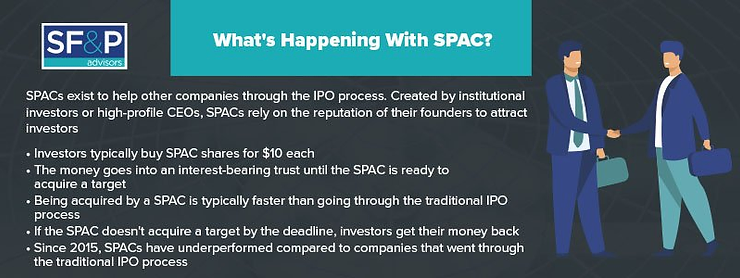Understand the role SPACs play in today’s mergers and acquisitions

Special purpose acquisition companies (SPAC) are one of the most compelling trends on Wall Street, and they are having a significant effect on the mergers and acquisitions (M&A) environment. If you don’t know what a SPAC is, this guide will walk you through the basics.
A SPAC is essentially a shell company designed to raise money through an initial public offering (IPO) with the intention of acquiring another company. In 2020, about 200 SPACS went public, and they raised $64 billion, almost the same amount of capital generated by all of the IPOs in 2019 combined.
Companies such as Virgin Galactic, DraftKings, Opendoor, Nikola Motor Co, and 23andMe have all avoided the traditional IPO process and instead went public after being acquired by SPACs. Big names like BuzzFeed and Vice Media have also been exploring this option.
How do SPACs work? What are the advantages compared to a traditional IPO? Why are investors so excited about this trend? Do they have downsides? Here’s what you need to know about these companies.
What do SPACs do?
Ultimately, SPACs exist solely to give other companies a back door into the IPO process. SPACs don’t make products. They don’t sell products. And they don’t have any commercial operations. In most cases, a SPAC’s only assets are the funds it raises during its own IPO.
Who creates SPACs?
Typically, institutional investors from private equity or hedge funds or high-profile CEOs create SPACs. Their reputation plays a significant role in the success of the SPAC. In most cases, investors don’t know what companies will be acquired by the endeavor, and of course, the SPAC alone doesn’t have any compelling characteristics to draw investors.
Instead, investors largely select SPACs based on the reputations of their founders. Founders with a long track record of success are generally more effective at convincing people to invest in the unknown.
Why are SPACs called “blank check companies”?
Sometimes, SPACS are referred to as blank check companies. This nickname derives from the phenomenon described above. When savvy SPAC founders can convince people to invest in the unknown, they are basically giving themselves a blank check. The more persuasive they are, the larger the blank check can be.
How do SPACs work?
Again, a SPAC raises money through an IPO with the intention of acquiring another company. Generally, SPAC IPOs cost $10 per share, and the money collected goes into an interest-bearing trust fund. Then, the SPACs founders look for a company to acquire, and the shareholders vote on whether to approve the deal.
Here’s a basic outline of the process. Diamond Eagle Acquisition Corp was formed and went public as a SPAC in 2019. A few months later, it merged with DraftKings and SBTech, a gambling tech platform. When the deal closed in April 2020, DraftKings began trading as a public company.
Once the acquisition is complete, the shareholders can switch their SPAC shares for shares in the newly acquired company, or they can take back their original investment plus the interest it earned while in the trust fund. Although the exact numbers can vary, the original SPAC investors usually end up owning about 20% of the newly merged company.
What happens if the SPAC founders don’t find an acquisition target?
SPACs run on deadlines. Generally, they have to find an acquisition target and set up a deal within two years of their IPO. If they don’t, the SPAC is liquidated and the investors get back their money plus interest.
What are SPACs popular now?
In 2020, 494 companies went public. This was a record-setting year — to put it into perspective, only 242 companies went public in 2019. Because about half of the 2020 IPOs were SPACs, they drove the increase, but why? These companies have been around for decades, but they are just now increasing in popularity.
Market volatility due to the pandemic caused part of the increased interest in SPACs. Many companies that were ready to go public delayed their IPOs because they weren’t ready to deal with the potential impact of market volatility. Instead of waiting, other companies took the SPAC route. Additionally, going through the SPAC door tends to be faster.
SPACs let companies receive an influx of capital much more quickly than they could with a traditional IPO. Companies taking this route can avoid the process of registering their IPO with the Securities and Exchange Commission, which often takes around six months. The SPAC doesn’t go through as much scrutiny because it doesn’t have any formal operations, and after the SPAC completes the IPO, the acquisition takes only a few months.
The SPAC also gives the acquired company the ability to negotiate its fixed valuation. This lends more predictability to the process than a traditional IPO.
What are the disadvantages to SPACs?
Although SPACs are perceived as lending some stability and ease to the IPO process, they don’t always garner positive results for their shareholders. Since 2015, 89 SPACs have completed mergers, but only 26 have boasted positive returns. They have delivered a median return of minus 36.1%. In contrast, the average after-market return from traditional IPOS since 2015 is 37.2%. This means that SPACs have not delivered on their promises to investors.
SPACs can offer a lot of potential for companies that are ready to go public but don’t want to go through the traditional IPO process. For shareholders, however, the results can be mixed, and investors need to think carefully before jumping on board the promises of an unknown investment.
Contact SF&P Advisors to talk about mergers and acquisitions today
The M&A environment is complex and confusing, and if you’re thinking about selling your business, merging with another company, or acquiring another business, you need a trusted advisor to help you. To learn more, contact us at SF&P Advisors today. We can answer your questions, provide you with a free valuation of your company, and guide you through the M&A process.
